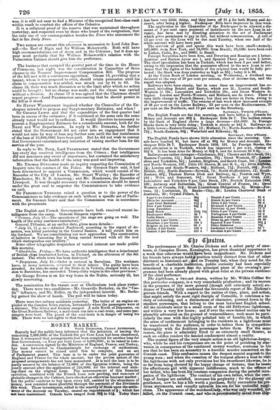The business that occupied the greater part of the time
in the House of Commons, last night, was the consideration in Committee of three clauses in the Tenants' Improvement Compensation Bill. The progress of the bill met with a continuous opposition. Clause 15, providing that a tenant, whom it was proposed to evict, should retain possession until his claim to compensation was settled, was struck out by 84 to 83. On clause 16, there was much discussion as to the limit after which no action could be brought ; but no change was made, and the clause was carried without a division. At clause 17 it was agreed that the Chairman should report progress—Lord PALMERSTON announcing that he should persist in the bill as it stood.
Sir HENRY WILLOUGHBY inquired whether the Chancellor of the Ex- chequer intended to propose any Supplementary Estimates, and when ? Sir GEORGE LEWIS said that the expenditure of the first quarter had been in excess of the estimates ; if it continued at the same rate the sums already voted would not be sufficient. It would therefore be necessary to present a Supplementary Estimate for a considerable amount, both for the Naval and War Departments. In reply to Mr. DISRAELI, he further stated that the Government did not enter into an engagement that it would not raise by way of loan any further sum until the last instalments of the loan of 16,000,0001. have been paid. But he did not wish to convey that Government entertained any intention of raising another loan for the service of the year.
In reply to Mr. RALK, Lord PALMERSTON stated that the Government has every day received intelligence from the Crimea ; that intelligence did not announce any event of importance, but contained the satisfactory information that the health of the army was good and improving.
Mr. THOMAS DONCOMBE made an inquiry respecting the Commission of Inquiry into the conduct of the Police. Sir GEORGE GREY said, it had been determined to appoint a Commission, which would consist of the Recorder of the City of London, Mr. Stuart Wortley ; the Recorder of Manchester, Mr. R. B. Armstrong ; and Mr. Henderson, the Recorder of Liverpool. It was thought necessary that a commission should be issued under the great seal to empower the Commissioners to take evidence on oath.
Sir FREDERICK THESIGER raised a question as to the power of the Commissioners to take evidence on oath without a specific act of Parlia- ment. Sir Geonnt GREY said that the Commission was in accordance with the precedents.


























 Previous page
Previous page